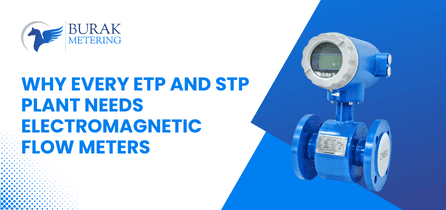 Phone
Phone

Effluent Treatment Plants (ETP) and Sewage Treatment Plants (STP) play a vital role in protecting our environment by treating harmful wastewater before discharge. But the efficiency of these plants relies heavily on accurate flow measurement devices. A small error in flow rate can lead to non-compliance with pollution control standards, process inefficiencies, and costly penalties.
This is where electromagnetic flow meters stand out. These meters offer precise, maintenance-free, and durable flow measurement, making them the ideal choice for the industrial fluid measurement needs of modern water treatment facilities.
If you're managing an ETP or STP, investing in reliable industrial flow meters is essential for smoother operations and regulatory compliance.
Electromagnetic flow meters, also called mag meters, are flow measurement devices that measure the flow rate of conductive liquids using Faraday’s Law of Electromagnetic Induction. When a conductive fluid like water flows through the magnetic field generated by the meter, it produces a voltage that’s proportional to the flow velocity.
Key advantages include:
1. Perfect for Dirty & Corrosive Fluids:
Wastewater contains sludge, chemicals, and debris that damage mechanical meters. But electromagnetic flow meters handle such fluids effortlessly, maintaining accuracy and longevity.
2. Ensure Compliance with Regulatory Norms:
Pollution control boards require industries and municipalities to submit accurate discharge flow reports. These meters ensure your plant meets these legal standards consistently.
3. Minimal Maintenance Downtime:
Since there are no mechanical parts inside the meter, maintenance is minimal, reducing plant downtime and repair costs.
4. Digital Output for Smart Plants:
Most industrial flow meters today provide real-time flow data that integrates easily with SCADA systems, making it easier to monitor, control, and optimize your plant processes remotely.
5. Long-Term Cost Savings:
While electromagnetic flow meters may have a higher upfront cost, they save money over time through accurate readings, longer life, and less maintenance.
Flow meters are critical across the entire treatment process:
In water and wastewater treatment, electromagnetic flow meters outperform turbine and mechanical flow meters in several ways:
For non-contact flow measurement or non-conductive fluids, ultrasonic flow meters may be used, but for conductive wastewater, electromagnetic flow meters are the industry standard.
When selecting a flow meter for an industrial process, plant managers should consider:
If unsure, consult a flow meter selection guide or speak with a flow meter manufacturer in India, like Burak Metering, who understands your industry.
At Burak Metering, we are a trusted flow meter manufacturer in India, specializing in industrial flow measurement solutions. Our electromagnetic flow meters are designed for the tough conditions of Indian water treatment plants.